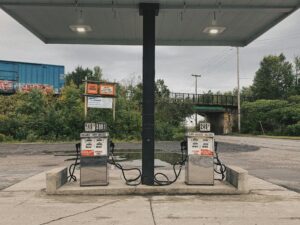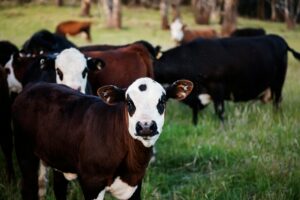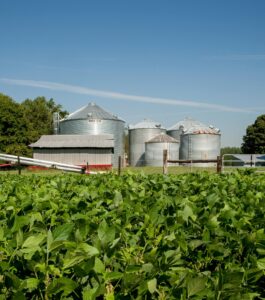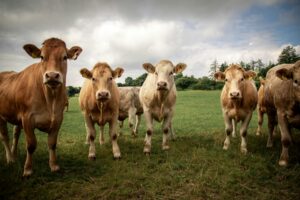A fuel-tax rebate exists for VAT registered farmers, who can claim money back on their diesel purchases. Find “Diesel refunds for primary production” on www.sars.gov.za.
They should (1) ensure the diesel purchase is in their own name (2) keep detailed records of what each litre was used for, and (3) track diesel from the point of purchase through storage and final use.
Introduction
What kind of engine oil should I use in my farm equipment?
The equipment owner should always select and use oil that at least meets the minimum API Engine Service Classification recommended by the engine manufacturer. Most gasoline engines require motor oils designated “API Service SG or better”. Farm diesel engines require oils designated “API Service CF-4 or better”.
What do you mean by “API Engine Service Classification” system?
This system, developed by the American Petroleum Institute, provides a guide for the selection of crankcase oils suitable for various service conditions. It classifies general ranges of engine service needs based upon:
- engine design and construction
- lubricating oil
- operating conditions
- maintenance practices
- fuel characteristics
Here’s how it works. Each service class is designated by letters, the first letter being “S” for petrol and “C” for diesel engines. The higher the second letter the higher the performance level of the oil. This provides a convenient means for the engine manufacturer to indicate the service characteristics of his various engine designs and hence their lubrication requirements.
Do the SAE numbers define oil quality?
No. The SAE numbers refer to the viscosity of oil only, as defined in the SAE Crankcase Oil Viscosity Classification. “Viscosity” is a measure of the “resistance to flow”, or you might say it is the “body” or “thickness” of the oil. A poor quality oil can have the same SAE viscosity classification as a good oil.
How is multi-viscosity oil different from a single viscosity oil?
A multi-grade oil is one which meets an SAE viscosity requirement at both 0oC and 100oC. It does not thin out as much when heated or thicken up as much when cooled as a single viscosity oil. For example, SAE 15W-40 oils meet cold cranking requirements of SAE 15W at 0oC and high temperature viscosity requirements of SAE 40 at 100oC. Thus, a multi-grade oil stretches the usable temperature range. It provides easier cold-weather starting, quicker, more efficient lubrication, reduced engine wear, and better fuel economy.
How often should I change engine oil in my tractor?
If your tractor is in A-1 mechanical condition, operating on the recommended type crankcase oil, and under normal operating conditions, follow instructions in the owner’s manual. If any of the conditions vary greatly, the drain period should be reduced accordingly.
Does oil actually wear out?
The functions of the engine oil are to lubricate, cool, seal and clean. When an oil loses its ability to perform any of these functions, it is worn out. Contamination of oil occurs in all engines. The contaminants are unburned and partially burned fuel; fuel combustion products, including water; dirt and dust. These contaminants eventually destroy the oil’s capability to function efficiently. Oil should be drained before it reaches this condition. Engines will run better – longer, when the oil is changed as recommended.
How effective are oil filters, and how often should they be changed?
Oil filters should be serviced in accordance with instructions contained in the service manual. When properly serviced, they do an effective job of removing the larger solid particles contaminating the oil, thereby reducing wear and increasing engine life. Oil filters cannot, however, remove the need for changing the oil at proper intervals.
What can cause one oil to become excessively thick as compared to another when both are used at the same operating temperatures and loads?
Excessive thickening of lubricating oil in service is associated with the amount of contaminants it contains and how much the oil has oxidized. For example, solid contaminants such as finely dispersed carbon in diesel engine oils can cause severe thickening. The thickening of crankcase oil in service is generally associated with infrequent oil drain practices.
What causes a crankcase oil to become discoloured?
Many engine oils are naturally dark in colour even before use because of their additive content. Further darkening of engine oils is normal in use. Marked changes in colour are caused by even minor amounts of contaminants. Dispersed carbon (fuel soot) causes diesel oils to become extremely dark very rapidly. Combustion residues from the antiknock additive in gasoline can cause a grey appearance. Water can cause a cloudy or emulsified appearance.
What causes crankcase oils to thin out?
The most common cause of motor oil thinning out is an excessive amount of unburned fuel entering the crankcase. This can be a warning of a mechanical problem unrelated to the lubricant.
What are API Gear Lubricant Service Classifications and what do they mean?
- API Service GL-1 describes a service which can be satisfied with a straight mineral lubricant.
- API Service GL-2 describes a service which can be satisfied with a rear axle worm gear lubricants. (Seldom used in farm equipment)
- API Service GL-3 describes a service which can be satisfied with a mild EP (extreme pressure) lubricant.
- API Service GL-4 describes a service which can be satisfied with a multipurpose-type gear lubricant generally regarded as one meeting the requirements of formed Military Specification MIL-L-2105.
- API Service GL-5 describes a service which can be satisfied with a multipurpose-type gear lubricant generally regarded as one meeting the requirements of Military Specification MIL-L-21058.
What makes hydraulic fluid foam?
Generally, this is caused by contaminants e.g. dirt or water. Also, a common cause is aeration, caused from an air leak into the hydraulic system.
Is the proper storage and handling of fuels and lubricants really as important as some oil company representatives indicate?
Yes! The source of many fuel and oil complaints is right at the fuel storage tank or oil drum, after delivery has been made to the consumer. Great care should be taken to keep water and other contaminants out of fuels and lubricants by storing drums under cover or on their sides to prevent rainwater from entering through the bung, by keeping fuel tanks filled to prevent moisture accumulation from condensation, and by keeping lubricant containers tightly closed when not in use.
Safety must also be considered in handling light petroleum products, fuel oil, diesel fuel, kerosene and gasoline. Mishandling and carelessness in handling these products are fire and explosion hazards. Never allow gasoline to mix with other products because it is a most volatile material. Only a small quantity of gasoline in diesel fuel or kerosene will lower the flash point and cause a serious safety hazard.
Does an oil lose its effectiveness in storage?
No, providing it is properly stored and contamination does not occur.
Source: ENGEN
Diesel and winter
Diesel is not like water, which is a simple mixture which freezes at a single temperature. Some elements in diesel freeze earlier than others and become waxy. These crystals turn the diesel cloudy, block the fuel filter and make it difficult to pump the diesel to the engine. Some companies include an additive to help this.
There are also other steps you can take:
- Make sure the fuel tanks are sheltered or located underground.
- Try to garage vehicles overnight or park them in a sheltered position.
- Ensure that there is no water in your tank; that any remaining summer diesel has been used up before winter starts (order your diesel in time!)
But remember: not all cold starting problems in winter are caused by fuel. Before winter starts, ensure that your fuel filters are clean, and are replaced according to the manufacturer’s schedule. Above all, make sure you are using a winter grade lubricant.
Source: SHELL
Installing filtration on bulk oil and diesel systems
With pre-cleaners you can extend the life of your air filter by removing up to 90% of the dirt and contaminants before it reaches the filter. The pre-cleaners are designed especially for equipment operating in very heavy dust and debris environments such as agricultural and construction vehicles and mining equipment.
Proper filtration:
- reduces downtime and resultant loss of production
- reduces component repair and replacement
- reduces fluid replacement and disposal costs
- reduces total cost of ownership
Filtration on bulk oil and diesel systems prevents the ingression of solid particulate matter into equipment when filling or topping up oil or fuel tanks. Over 70% of system failures are the direct result of poor fluid condition or management. In addition to prolonged component life, cleaner diesel gives other benefits, including improved fuel consumption and reduced service costs.
Source: Donaldson Filtration Solutions
International business environment
- www.opec.org – Organisation of the Petroleum Exporting Countries (OPEC). Find the Monthly Oil Market Report, OPEC Bulletins and other publications here.
- The fuel price in South Africa is linked to the price of crude oil in international markets and is quoted in US dollars (US$) per barrel. International prices are essentially driven by supply and demand for product in a particular market. Crude oil prices combined with the Rand/Dollar exchange rate therefore have a major impact on fuel prices.
Local business environment
- Fuel generally accounts for 11%-13% of production costs for grain and oilseed farmers. It is also worth noting that SA transports about 81% of maize, 76% of wheat and 69% of soya beans by road. On average, 75% of national grains and oilseeds are transported by road (Sihlobo, 2025).
- The BFAP Agricultural Outlooks look at the effect of steep input costs on farmer profitability.
- The formula for how the pump price of fuel is arrived at can be found on a number of websites including www.dmre.gov.za (the Department of Mineral and Petroleum Resources), https://fuelsindustry.org.za (the Fuels Industry Association of South Africa (Fiasa)) and www.cefgroup.co.za. CEF (Pty) Ltd is responsible for administering the system that sets the petrol price.
- Plans to ban the sale of diesel containing more than 10 parts per million (ppm) of sulfur by 2027 are still in motion (Liberia, 2024).
National strategy
The government department relevant to this page is the Department of Mineral and Petroleum Resources (DMPR), previously Department of Mineral Resources and Energy. Visit www.dmre.gov.za.
The National Energy Regulator (NERSA) has a mandate is to regulate the electricity, piped-gas and petroleum pipeline industries in terms of the Petroleum Pipelines Act, 2003 (Act No. 60 of 2003). Visit www.nersa.org.za.
The CEF Group of Companies is a private company, incorporated in terms of the Companies Act, and is governed by the CEF Act. It manages the operation and development of the oil and gas assets and operations of the South African government. See www.cefgroup.co.za.
The South African National Petroleum Company (SANPC) was formed from the merger of PetroSA, iGas, and the Strategic Fuel Fund. See https://sa-npc.co.za.
South African Bureau of Standards (SABS) www.sabs.co.za The diesel standard (specification), SANS 342, like all national standards developed by Standards South Africa – the standards-generating division of the SABS – was developed through consensus by a national technical committee consisting of stakeholders in the field.
Role players
View the Premium Listings below (scroll down or click on “Premium Listings” on the Table of Contents to the right).
Further reference:
Companies
- Find the link to all Fuels Industry Association of South Africa (Fiasa) members at https://fuelsindustry.org.za. These include BP Southern Africa, Chevron South Africa, Engen Petroleum, Shell South Africa and Total South Africa.
Websites and publications
Visit the websites listed earlier on this page.
- Find the SARS presentation “Diesel Refund Reform: Review of the administrative system” (October 2021) to Agbiz.
- Various representative bodies in agriculture have items on their websites to do with fuel (fuel prices, fuel rebates etc). Examples include Agbiz, Agri SA, Canning Fruit Producers’ Association, Grain SA and more.
Some articles
- Read our blog “Diesel Refund Reforms Promise Welcome Relief to SA Farmers” and “South African farmers can reduce the impact of fuel price hikes on production costs”.
- Libera M. 2025, December 21. “Diesel ban still on the cards for South Africa.” BusinessTech. Available at https://businesstech.co.za/news/energy/846500/diesel-ban-still-on-the-cards-for-south-africa
- Labuschagne H. 2025, October 29. “Bad news for people who drive diesel cars in South Africa.” My Broadband. Available at https://mybroadband.co.za/news/motoring/615831-bad-news-for-people-who-drive-diesel-cars-in-south-africa.html
- Du Plessis C. 2025, July 15. “Diesel refunds: why farmers struggle to claim what’s rightfully theirs.” Farmer’s Weekly. Available at www.farmersweekly.co.za/agri-news/south-africa/diesel-refunds-why-farmers-struggle-to-claim-whats-rightfully-theirs/
- Geiger J. 2025, May 23. “South Africa Launches Oil Giant to Revive Energy Sector.”Oil Price. Available at https://oilprice.com/Latest-Energy-News/World-News/South-Africa-Launches-Oil-Giant-to-Revive-Energy-Sector.html
- Taylor M. 2025, February 11. “Cheaper diesel in the works for South Africa – Details”. Top Auto. Available at https://topauto.co.za/features/124471/cheaper-diesel-in-the-works-for-south-africa-detail
- Crosby A. 2025, January 20. “Agbiz presents its concerns at Petroleum Products Draft Bill public hearings”. Agbiz. Available at www.agbiz.co.za/article/agbiz-presents-its-concerns-at-petroleum-products-draft-bill-public-hearings-845
- Libera M. 2024, December 5. “Diesel ban in South Africa still coming”. BusinessTech. Available at https://businesstech.co.za/news/motoring/802983/diesel-ban-in-south-africa-still-coming
- Libera M. 2024, October 14. “Petrol station warning in South Africa”. BusinessTech. Available at https://businesstech.co.za/news/trending/795016/petrol-station-warning-in-south-africa
- Du Toit A. 2024, August 5. “Warning for South Africans driving diesel cars”. Top Auto. Available at https://topauto.co.za/news/111602/warning-for-south-africans-driving-diesel-cars
- Neethling B. 2024, March 18. “Here’s how much government has made from fuel taxes”. Daily Investor. Available at https://dailyinvestor.com/energy/47135/heres-how-much-government-has-made-from-fuel-taxes
- Reporter. 2024, January 24. “Dodgy diesel is rife. THIS is what it does to your engine”. Primedia+. Available at www.primediaplus.com/2024/01/24/dodgy-diesel-is-rife-this-is-what-it-does-to-your-engine
- Jacobs S. 2023, June 6. “Why petrol is so expensive in South Africa”. Daily Investor. Available at https://dailyinvestor.com/energy/18087/why-petrol-is-so-expensive-in-south-africa
- Du Toit A. 2023, May 18. “South Africa one step closer to having a new state-owned petrol company”. Top Auto. Available at https://topauto.co.za/news/76218/south-africa-one-step-closer-to-having-a-new-state-owned-petrol-company/
- Mahlakoana T. 2021, September 27. “Oil industry one of key drivers of economic activity in SA – study”. Eye Witness News. Available at https://ewn.co.za/2021/09/27/oil-industry-one-of-key-drivers-of-economic-activity-in-sa-study
- Bloomberg. 2021, September 4. “South Africa banning 50ppm diesel”. MyBroadBand. Available at https://mybroadband.co.za/news/motoring/412622-south-africa-banning-50ppm-diesel.html
- Ndenze, B. 2019, July 11. “Mantashe repeats call for review of SA’s fuel price structure”. Eye Witness News. Available at https://ewn.co.za/2019/07/11/mantashe-repeats-call-for-review-of-sa-s-fuel-price-structure
- Phillips, L. 2018, September 17. “‘Diesel now second highest input cost’ – Grain SA”. Farmer’s Weekly. Available at www.farmersweekly.co.za/agri-news/south-africa/diesel-now-second-highest-input-cost-grain-sa/
Photo by Mark Stebnicki: https://www.pexels.com/photo/low-angle-shot-of-industrial-containers-against-blue-sky-11678741/





